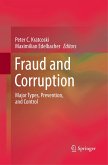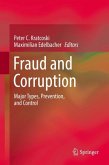This book is the first attempt to establish 'economic crime' as a new sub-discipline within criminology. Fraud, corruption, bribery, money laundering, price-fixing cartels and intellectual property crimes pursued typically for financial and professional gain, have devastating consequences for the prosperity of economic life. While most police forces in the UK and the USA have an 'economic crime' department, and many European bodies such as Europol use the term and develop strategies and structures to deal with it, it is yet to grain traction as a widely used term in the academic community. Economic Crime: From Conception to Response aims to change that and covers:
definitions of the key premises of economic crime as the academic sub-discipline within criminology;
an overview of the key research on each of the crimes associated with economic crime;
public, private and global responses to economic crime across its different forms and sectors of the economy, both within the UK and globally.
This book is an essential resource for students, academics and practitioners engaged with aspects of economic crime, as well as the related areas of financial crime, white-collar crime and crimes of the powerful.
definitions of the key premises of economic crime as the academic sub-discipline within criminology;
an overview of the key research on each of the crimes associated with economic crime;
public, private and global responses to economic crime across its different forms and sectors of the economy, both within the UK and globally.
This book is an essential resource for students, academics and practitioners engaged with aspects of economic crime, as well as the related areas of financial crime, white-collar crime and crimes of the powerful.
"The scope of economic crimes are unparalleled in modern times, particularly with the rise of the Internet and online financial services. This work provides an excellent approach to understand these offenses, and the individuals responsible. It is essential reading for professionals and the academy."
Thomas Holt, School of Criminal Justice at Michigan State University, USA
"This volume makes a convincing case for an offense-based approach to the category of economic crimes, ranging from corporate cartels and money laundering, to counterfeiting, industrial espionage and intellectual property crime. It provides an encompassing overview of these crimes as well as a highly up-to-date and integrated discussion of national, transnational and private policing of economic crimes. An accessible and well-written introduction that is useful to anyone interested in understanding the character and harmfulness of crimes in the context of global business, as well as in the design of smart prevention strategies."
Judith van Erp, Professor of Regulatory Governance, Utrecht University, The Netherlands
"This is a very helpful compendium to guide private and public sector practitioners and scholars through a rapidly evolving field of theory and action, and a clarion call for more serious evidence-based resourcing and policy attention to a range of economic crimes"
Michael Levi, Professor of Criminology, Cardiff University
"This book delivers on the case for economic criminology! In an engaging and accessible style, it walks the reader through the complexity of the types, causes and consequences of economic crimes. Effectively balancing theory and practice, and not shying away from critical definitional issues, it is chock full of illustrative and provocative examples. Button, Hock and Shepherd have created a strong foundation for students, scholars, policy makers and practitioners to further advance this critical yet understudied area of criminology."
Jeremy M. Wilson, Professor, School of Criminal Justice, Michigan State University, US
"This is a go-to text for understanding the latest patterns in the fast-evolving area of economic crime. The authors combine analytical clarity with an entertaining readable style, providing fascinating insights into an area that is under-researched despite being an increasingly present part of our lives."
Elizabeth Dávid-Barrett, Professor of Governance and Integrity, University of Sussex, UK
Thomas Holt, School of Criminal Justice at Michigan State University, USA
"This volume makes a convincing case for an offense-based approach to the category of economic crimes, ranging from corporate cartels and money laundering, to counterfeiting, industrial espionage and intellectual property crime. It provides an encompassing overview of these crimes as well as a highly up-to-date and integrated discussion of national, transnational and private policing of economic crimes. An accessible and well-written introduction that is useful to anyone interested in understanding the character and harmfulness of crimes in the context of global business, as well as in the design of smart prevention strategies."
Judith van Erp, Professor of Regulatory Governance, Utrecht University, The Netherlands
"This is a very helpful compendium to guide private and public sector practitioners and scholars through a rapidly evolving field of theory and action, and a clarion call for more serious evidence-based resourcing and policy attention to a range of economic crimes"
Michael Levi, Professor of Criminology, Cardiff University
"This book delivers on the case for economic criminology! In an engaging and accessible style, it walks the reader through the complexity of the types, causes and consequences of economic crimes. Effectively balancing theory and practice, and not shying away from critical definitional issues, it is chock full of illustrative and provocative examples. Button, Hock and Shepherd have created a strong foundation for students, scholars, policy makers and practitioners to further advance this critical yet understudied area of criminology."
Jeremy M. Wilson, Professor, School of Criminal Justice, Michigan State University, US
"This is a go-to text for understanding the latest patterns in the fast-evolving area of economic crime. The authors combine analytical clarity with an entertaining readable style, providing fascinating insights into an area that is under-researched despite being an increasingly present part of our lives."
Elizabeth Dávid-Barrett, Professor of Governance and Integrity, University of Sussex, UK








